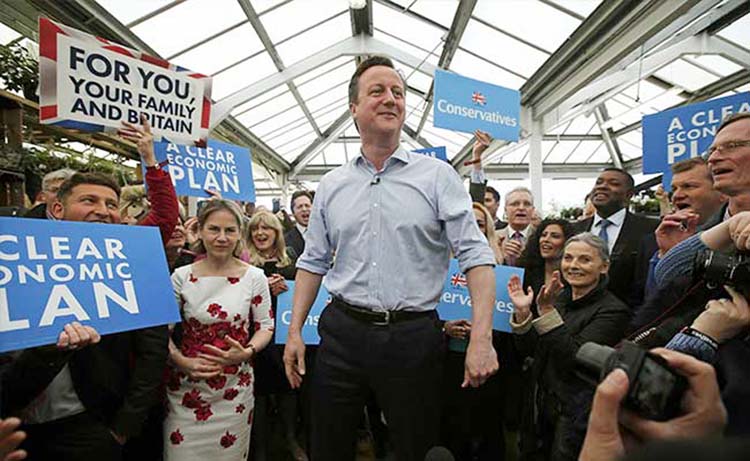
AFP, London :Britain’s political leaders today began a final push for votes ahead of Thursday’s knife-edge election, even as they prepared for the likelihood of protracted coalition talks once polls close.Conservative Prime Minister David Cameron, whose party is running neck and neck with the opposition Labour party in the opinion polls, kicked off a 36-hour tour of the country that will see him campaign through the night.He urged people to give his party a clear mandate to govern or face years of “back-room deals” and “bribes” as Labour sought to form a government with the support of the smaller Scottish National Party (SNP).But Cameron himself faces an uphill struggle to win enough seats in the House of Commons to govern alone and would most likely also need to turn to smaller parties to stay in power.Both Cameron and Labour leader Ed Miliband – who is basing his final election push on a warning about funding for the state-run National Health Service (NHS) – have insisted they are aiming for a parliamentary majority.In reality, all sides are planning how they will seize the initiative on Friday morning after an uncertain result.Liberal Democrat leader Nick Clegg, whose centrist party has been the junior partner in Cameron’s Tory-led coalition for the past five years, is keeping his options open.Launching a tour in Land’s End in southwest England that will end in John O’Groats in northern Scotland, Clegg said he would support the party with the “greatest mandate”.”If the party with the greatest mandate from the British people, if they wanted to reach out to the Liberal Democrats, of course I would listen,” he told BBC radio.Clegg’s party could lose half of its 57 seats in the 650-seat House of Commons, however.Miliband meanwhile, whose Labour party is heavily dependent on funding from trade unions, is reportedly planning to reach out to union leaders within days of the election result to seek support for their options for taking power. All sides are also fighting a psychological battle to define what would be a “legitimate” government.Meanwhile, Britons are more likely to vote to stay part of the European Union than leave in a future membership referendum, a poll showed on Monday, with only 18 per cent saying they would definitely elect to exit the bloc.The YouGov poll for The Times newspaper asked the question because Britain faces a close national election on Thursday and Prime Minister David Cameron has promised to hold such an in-out referendum if re-elected.Such a referendum has not been held in Britain since 1975, when the country first joined what was then the European Economic Community.

